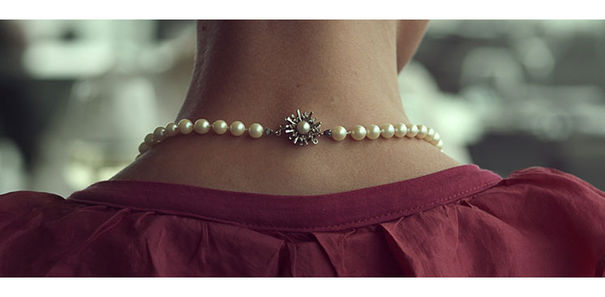Burning Money, Carving Cows
Ivan Velisaljević of the 2013 Talent Press Sarajevo reviews Daniel Hoesl's riveting feature debut about class and culture SOLDATE JEANETTE.

Daniel Hoesl's SOLDATE JEANETTE
Daniel Hoesl's SOLDATE JEANETTE is a meditation on the value of money, as well as the courage to change ones lifestyle and socially constructed identity, done in the stylistic manner of the New German Cinema of the 1960s and 1970s. Hoesl claims he made this film without a screenplay, mixing experienced theatre actors, such as Johanna Orsini-Rosenberg (in the leading role of Fanni), with non-actors such as Christina Reichsthaler (in the role of Anna), letting them rely on their biographies to create scenes. His experience as an assistant director on the PARADISE trilogy adds to certain similarities with Ulrich Seidl's films, but Hoesl's approach is very different. Distancing effects in acting (Johana Rosenberg's strong presence and the deadpan acting style), cabaret-like soundtrack, ironical references to Godard, and the emphasis on the contrast between iconography, the social milieu of the working class and the bourgeoisie, relate Hoesl more to Fassbinder than to Seidl.
Fanni is a rich person who has money troubles, but who denies the problem until she is thrown out of her apartment. However, she is not impressed with material advantages, and invests much more effort into training in martial arts, going to massage sessions and adhering to wellness programs. These hints insinuate there is something more to Fanni than her denial of the bankruptcy problems she is having, details of which are never clarified. It is not really important what exactly is behind it; what matters is her decision to make a radical break in her lifestyle, so she burns the money she has swindled and goes to a farm in the mountains. The shocking and intense scene of a butcher carving a cow in the slaughterhouse marks the transition to the second story. Hoesl not only intensifies his point about the split between the upper and lower classes, the urban bourgeoisie and the rural working class, civilization and nature, but also the split in the personalities of his heroines. Anna, the second female character in the film, feels at odds with her environment of hayricks and cow dung, where she is being insulted, bossed around and sexually exploited by her boss Ernst. So, when Fanni steals Ernst's car keys and gives her dress to Anna – urging her to leave the farm – Anna finally decides to take the step Fanni has already taken: but in the opposite direction.
Since it focuses on the two women and their decision to liberate themselves from their former existences, SOLDATE JEANETTE bears a very general resemblance to THELMA AND LOUISE – only it is a lot slower. The two women meet in the second half of the film, and when the police chase starts, the film ends. Moreover, in Hoesl's film the two women don't go on the road together, since each of them has a different goal in sight.
Hoesl is more concerned with the form and the political statement than with explaining every aspect of the narrative, but the lack of plausible causes and clear motivation is more than recouped by memorable actors, precise construction of shots, and the astute use of visuals. Many scenes are shot with almost no camera movements and with few cuts, the visual dynamic relying on the contrast between the configurations of spaces, and there are a number of very visceral moments, as well as scenes of striking visual beauty. Gerald Kerkletz, a cinematographer who worked with Markus Schleinzer on his Palme d’Or nominated film MICHAEL (2011), contrasts showrooms with washed-out colors, the sterile spaces of banks and boutiques where grey, brown and white dominate, with the very different palette of the farm, coloured in yellow, dark green and ochre. Bettina Köster's original music adds to the emotional impact of the story, and so does the song by the band Gustav, in the memorable scene when a herd of cows slowly passes through the shot.
Even though it leaves a lot of unexplained gaps in the narrative, and is more concerned with style and message than with a clear story, Hoesl's distinctive debut has a lot to offer the audience who is fond of this type of cinema.

